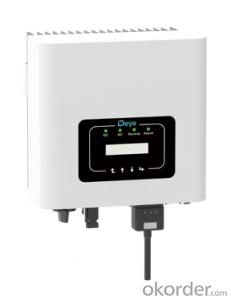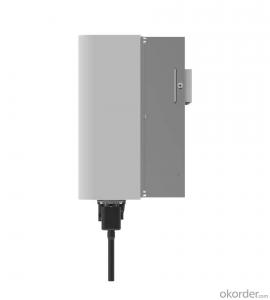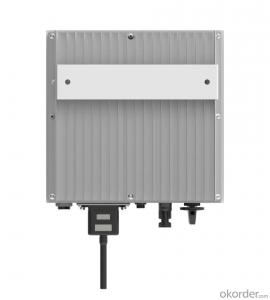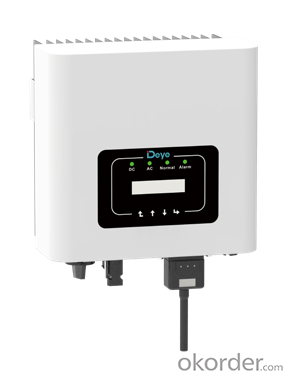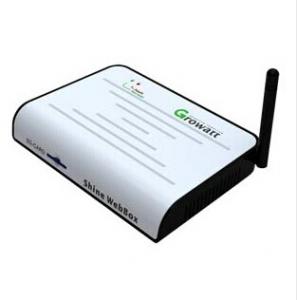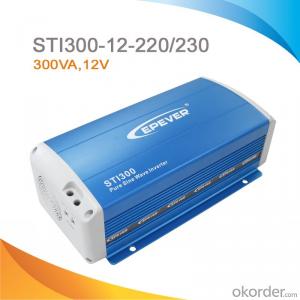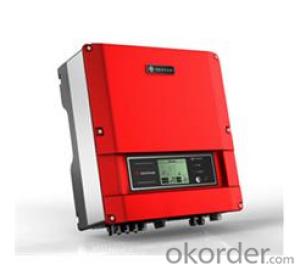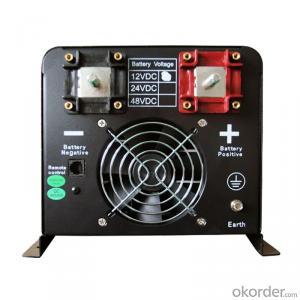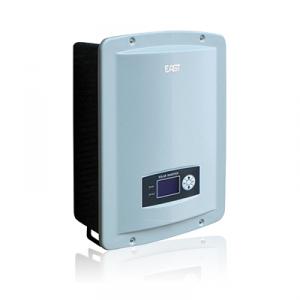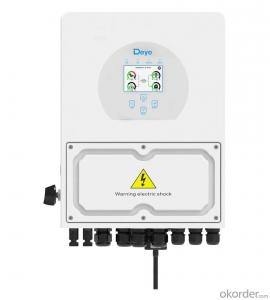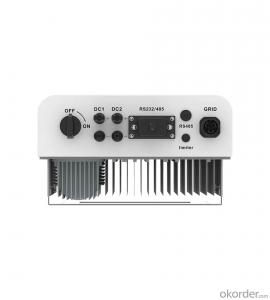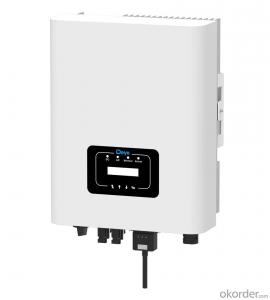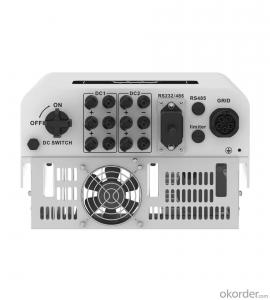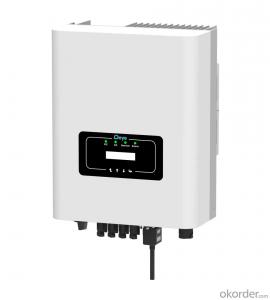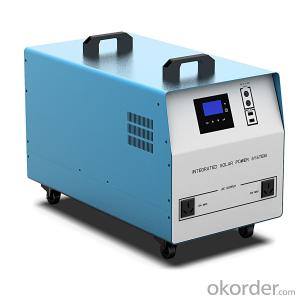Solar Inverter Dealer - sun-1/1.5/2/2.5/3k-g | 1.5-3kw | Single Phase | 1 MPPT
- Loading Port:
- Ningbo
- Payment Terms:
- TT OR LC
- Min Order Qty:
- 100 pc
- Supply Capability:
- 5000 pc/month
OKorder Service Pledge
OKorder Financial Service
You Might Also Like
Specification
The innovative design of the SUN-1/1.5/2/2.5/3K-G is not only easy to install, but also allows for quick DC and AC connections. E.g. it weighs just 6 kg. Commissioning is equally easy, because the integrated user interface (local LCD display and buttons) makes it possible to choose the necessary settings quickly.
· 1 MPP tracker, Max. efficiency up to 97.5%
· Zero export application,VSG application
· String intelligent monitoring (optional)
· Wide output voltage range
· Anti-PID function(Optional)
| Technical Data | ||||||
| Model | SUN-1K-G | SUN-1.5K-G | SUN-2K-G | SUN-2.5K-G | SUN-3K-G | |
| Input Side | ||||||
| Max. DC Input Power (kW) | 1.3 | 2 | 2.6 | 3.3 | 3.9 | |
| Max. DC Input Voltage (V) | 550 | |||||
| Start-up DC Input Voltage (V) | 80 | |||||
| MPPT Operating Range (V) | 70~500 | |||||
| Max. DC Input Current (A) | 13 | |||||
| Max. Short Circuit Current (A) | 19.5 | |||||
| Number of MPPT / Strings per MPPT | 1/1 | |||||
| Output Side | ||||||
| Rated Output Power (kW) | 1 | 1.5 | 2 | 2.5 | 3 | |
| Max. Active Power (kW) | 1.1 | 1.7 | 2.2 | 2.75 | 3.3 | |
| Nominal Output Voltage / Range (V) | L/N/PE 220V/0.85Un-1.1Un, 230V/0.85Un-1.1Un (Optional) | |||||
| Rated Grid Frequency (Hz) | 50 / 60 (Optional) | |||||
| Operating Phase | Single phase | |||||
| Rated AC Grid Output Current (A) | 4.3 | 6.5 | 8.7 | 10.9 | 13 | |
| Max. AC Output Current (A) | 4.8 | 7.2 | 9.6 | 12 | 14.3 | |
| Output Power Factor | 0.8 leading to 0.8 lagging | |||||
| Grid Current THD | <3%< td=""> | |||||
| DC Injection Current (mA) | <0.5%< td=""> | |||||
| Grid Frequency Range | 47~52 or 57~62 (Optional) | |||||
| Efficiency | ||||||
| Max. Efficiency | 97.3% | 97.3% | 97.3% | 97.3% | 97.5% | |
| Euro Efficiency | 97.1% | 97.1% | 97.1% | 97.1% | 97.3% | |
| MPPT Efficiency | >99% | |||||
| Protection | ||||||
| DC Reverse-Polarity Protection | Yes | |||||
| AC Short Circuit Protection | Yes | |||||
| AC Output Overcurrent Protection | Yes | |||||
| Output Overvoltage Protection | Yes | |||||
| Insulation Resistance Protection | Yes | |||||
| Ground Fault Monitoring | Yes | |||||
| Anti-islanding Protection | Yes | |||||
| Temperature Protection | Yes | |||||
| Integrated DC Switch | Yes | |||||
| Remote software upload | Yes | |||||
| Remote change of operating parameters | Yes | |||||
| Surge protection | DC Type II / AC Type II | |||||
| General Data | ||||||
| Size (mm) | 280W×272.5H×184D | |||||
| Weight (kg) | 4.8 | |||||
| Topology | Transformerless | |||||
| Internal Consumption | <1W (Night) | |||||
| Running Temperature | -25~65℃, >45℃ derating | |||||
| Ingress Protection | IP65 | |||||
| Noise Emission (Typical) | <25 dB | |||||
| Cooling Concept | Natural cooling | |||||
| Max. Operating Altitude Without Derating | 2000m | |||||
| Warranty | 5 years | |||||
| Grid Connection Standard | CEI 0-21, VDE-AR-N 4105, NRS 097, IEC 62116, IEC 61727, G99, G98, VDE 0126-1-1, RD 1699, C10-11 | |||||
| Operating Surroundings Humidity | 0-100% | |||||
| Safety EMC / Standard | IEC/EN 61000-6-1/2/3/4, IEC/EN 62109-1, IEC/EN 62109-2 | |||||
| Features | ||||||
| DC Connection | MC-4 mateable | |||||
| IP65 rated plug | ||||||
| Display | LCD1602 | |||||
| Interface | RS485/RS232/Wifi/LAN | |||||
- Q: Can a solar inverter be used with different brands of solar panels?
- Yes, a solar inverter can generally be used with different brands of solar panels as long as they have compatible specifications and operating voltages. However, it is important to consult the manufacturer's guidelines or seek professional advice to ensure compatibility and optimal performance.
- Q: Can a solar inverter be used in a solar-powered street lighting system?
- Yes, a solar inverter can be used in a solar-powered street lighting system. A solar inverter is responsible for converting the direct current (DC) produced by solar panels into alternating current (AC) that can be used to power the street lights. Therefore, it plays a vital role in ensuring that solar energy is efficiently utilized in the lighting system.
- Q: Can a solar inverter be used in regions with high levels of air pollution?
- Yes, a solar inverter can be used in regions with high levels of air pollution. Air pollution does not directly impact the functioning of a solar inverter. However, it is important to regularly clean and maintain the solar panels to ensure optimal performance, as air pollution can accumulate on the surface of the panels and reduce their efficiency.
- Q: What is the maximum efficiency at partial load for a solar inverter?
- The maximum efficiency at partial load for a solar inverter refers to the highest level of efficiency that can be achieved when the inverter is operating at less than its full capacity. This efficiency is typically lower than the maximum efficiency at full load, as the inverter may not be able to convert the same amount of energy with the same level of efficiency when it is not running at its maximum capacity.
- Q: What certifications should I look for when choosing a solar inverter?
- When choosing a solar inverter, it is important to look for certifications such as UL listing, IEC 61727 compliance, and IEEE 1547 compliance. These certifications ensure that the inverter meets safety and performance standards, and is compatible with grid connection requirements.
- Q: What is the role of a DC-DC converter in a solar inverter?
- The role of a DC-DC converter in a solar inverter is to convert the direct current (DC) generated by the solar panels into the appropriate voltage level required for the inverter to convert it into alternating current (AC) electricity. This conversion ensures efficient power transfer from the solar panels to the grid or for use in residential or commercial applications.
- Q: Can a solar inverter be used with a solar-powered vehicle?
- Yes, a solar inverter can be used with a solar-powered vehicle. The solar inverter is responsible for converting the DC power generated by the solar panels into AC power that can be used to power various devices and components in the vehicle, such as the motor, lights, and electronics.
- Q: How do you choose the right input voltage range for a solar inverter?
- To choose the right input voltage range for a solar inverter, it is essential to consider the specifications and requirements of both the solar panels and the inverter. The input voltage range of the inverter should be compatible with the output voltage range of the solar panels. It is important to ensure that the inverter can handle the maximum voltage generated by the panels during peak sunlight conditions. Additionally, factors such as temperature variations and system losses should also be taken into account while selecting the appropriate input voltage range for a solar inverter.
- Q: Can a solar inverter be used with a grid-tied system and a battery backup?
- Yes, a solar inverter can be used with a grid-tied system and a battery backup. In such a setup, the solar inverter will convert the DC power generated by the solar panels into AC power for use in the home or to feed back into the grid. The grid-tied system allows excess solar power to be sold back to the grid, while the battery backup system stores excess power for use during times of low solar generation or power outages.
- Q: Is the PV inverter a current source or a voltage source?
- Photovoltaic inverter, also known as power regulator, according to the inverter in the use of photovoltaic power generation system can be divided into two kinds of independent power supply and grid.
Send your message to us
Solar Inverter Dealer - sun-1/1.5/2/2.5/3k-g | 1.5-3kw | Single Phase | 1 MPPT
- Loading Port:
- Ningbo
- Payment Terms:
- TT OR LC
- Min Order Qty:
- 100 pc
- Supply Capability:
- 5000 pc/month
OKorder Service Pledge
OKorder Financial Service
Similar products
Hot products
Hot Searches
Related keywords
